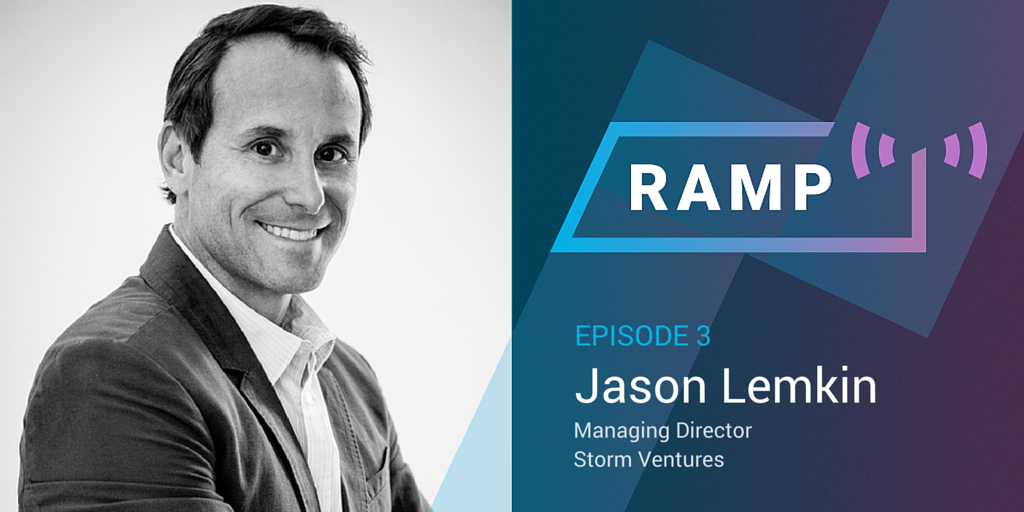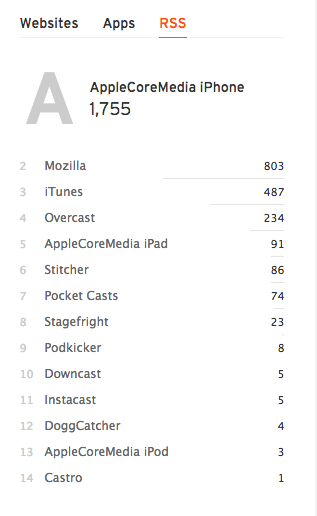One year ago today, I launched Ramp: The InsightSquared Podcast.
After months of preparation and hours of editing, I published the first 3 episodes on every available podcasting platform. I had no idea if anyone would listen, or if there was even an audience for a podcast on a topic as specific as SaaS analytics.
It was a pure content marketing experiment – something to try and see if it got results.
Now, after 30 episodes, more than 30,000 downloads, and multiple podcast-influenced deals for InsightSquared, I can confidently say that our little experiment was a success.
However, the downloads and dollars don’t fully encompass everything the podcast has done for our business. A company podcast offers value not just from the new listeners you engage, but also from the guests you invite on the show.
I’ve realized that podcasting isn’t just a form of content marketing – it’s both content AND influencer marketing.
In fact, it’s the best kind of influencer marketing. Podcasting helps you build organic, authentic, and powerful relationships with top names in your industry.
Here’s how a podcast can help your company build relationships with the top names in your industry.
Sign up for our free influencer marketing ecourse to learn how to build a full influencer marketing strategy in one week.
How to build influencer relationships through podcasting
Pursue the best guests
The first step to using your podcast as influencer marketing is targeting top influencers. To launch the podcast, you have to start strong and interview the leading names in your space.
Luckily, a podcast is the perfect cold ask. It’s flattering, takes a minimal time commitment from the influencer, and offers a valuable and long-lasting piece of content.
Because podcasting is still an exciting and rapidly-growing medium, even high-profile influencers are often willing to appear as guests on industry podcasts.
For Ramp, one of our earliest episodes was with SaaS Venture Capitalist Jason Lemkin. He has a huge audience of rabid fans, and his episode continues to be one of our most popular a year later — gaining new downloads every single week.
By starting with such a well-known name, Ramp quickly gained a solid reputation in the SaaS world. Referencing Lemkin made it easier for me to reach the next high-profile guest, and the guest after that.

As the podcast grew, I made sure to keep the quality of the guests high — specifically seeking out influencers that InsightSquared wanted to build a strong connection with.
The access a podcast gives you is tough to beat. After an hour-long, in-depth interview with an influencer, it’s almost hardnotto build a relationship.
You’ll learn something new, your listeners will love the episode, and – most importantly – your guest will have a positive and highly personal experience with your company.
Make it win/win
You have to remember that the podcast isn’t all about you and your company. If you’re too selfish in your promotion of the podcast, you won’t continue to book high quality guests.
When you interview a top influencer, make sure they’re also gaining value from the experience. It’s a symbiotic relationship – you’re reaching their audience, and they’re reaching yours. Whether they’re trying to promote a new book or raise the profile of their brand, they should gain something tangible from appearing on your podcast.
This is obviously tougher to do when you’re just starting out. When Ramp was brand new, the podcast only had a few hundred subscribers – nothing to brag about. I was often at a loss when pitching to prospective guests, since I couldn’t impress them with data.
Instead, I pitched the podcast as free content. If they were willing to give me just an hour of their time, I provided them with everything they needed:
- A highly-edited and high-quality podcast episode
- A short blog post*
- Social media content to share easily
*Pro tip: I send every podcast guest a short blog post they can publish on their own website, with the SoundCloud embed code. This makes it easy for the guest, and the podcast gets the benefit of a link back from a high-profile website, driving new traffic to the site.
I know that top influencers are insanely busy, and they’re always looking for great content to boost their brand, without too much effort on their part. This pitch worked wonders.
People were happy to come on the podcast, and happy to promote their episode once it published. I made sure that being a guest on Ramp was easy, valuable, and even a little fun.
Track your podcast’s success
Every podcast starts out with nothing – no listeners, no visibility, and no idea who is really listening. Unfortunately, podcasts remain one of the most difficult types of content to track.
The analytics solutions available for podcasters today are severely lacking in detail.

There are no UTM codes for audio, so it’s tough to know if you’re reaching the right audience.
You can see the total number of downloads, but you have no idea who those listeners are or whether they listened to one minute, or the whole episode.
This inability to track success makes it incredibly difficult to prove the business value of a podcast.
When I first started Ramp, I relied heavily on anecdotal stories from our sales team to tell me when prospects engaged with the podcast. Sales reps would simply email me and say, “Sales VP X is a big fan of the podcast.”
While it was great to hear we were reaching our target audience, I couldn’t tell how big our reach really was, or if it really had an impact on our business.
Once I realized the massive benefits of podcasting for influencer marketing, the ROI became much more clear-cut. I worried less about tracking listener data and refocused my energies on influencers.
It’s much easier to prove a podcast’s value when you can show that you’ve interviewed 20 influencers in your industry, all of whom have shared the podcast to a combined audience of more than 500,000 people.
By focusing on influencer marketing first, you’ll then see your audience numbers improve. Much like monthly recurring revenue in SaaS, podcast growth has a tendency to compound over time.
When you start out with just 3 episodes, 300 downloads seems like a lot. Each time you publish a new episode, the numbers grow. Each influencer shares their personal episode, and some of their fans become new listeners of your podcast.
You’ll start to see more and more people go back and “discover” your older episodes. The download numbers will start to pile up, leading to more and more growth, making it easier and easier to attract top influencers as guests. Once you hit that point, your podcast is on the right track.
Are you up for the challenge?
Now, I won’t lie – podcasting is hard work. If anyone tells you otherwise, they’re probably paying someone else to do the editing, scheduling, and writing that it takes to produce a great show. (Which, to be fair, is an option if you have the budget.)
But if you’re up for the challenge, there’s no better way to reach influencers, grow your content audience, and increase your company profile than a podcast.
Thinking of starting a podcast yourself? I’d love to hear how, why, and when you plan to launch. Leave a comment below, and tell me all about it.






